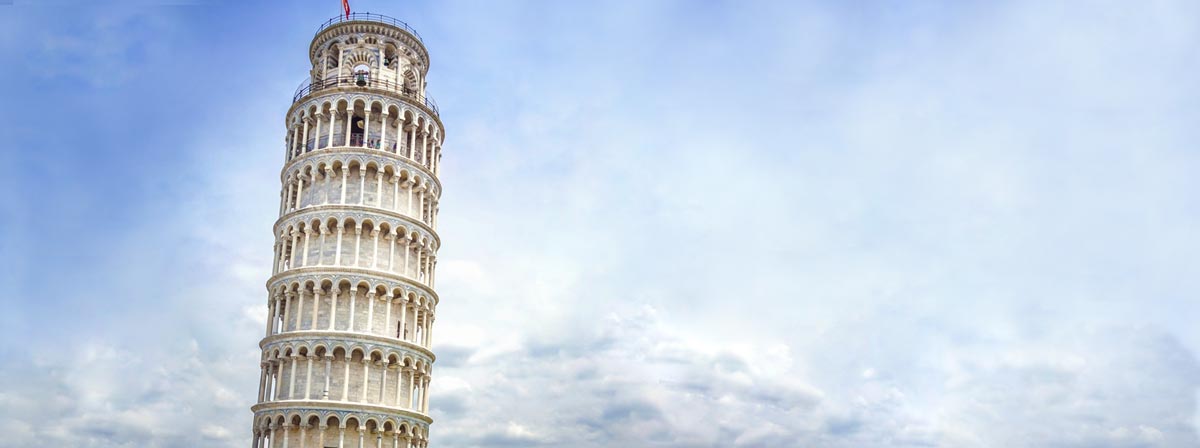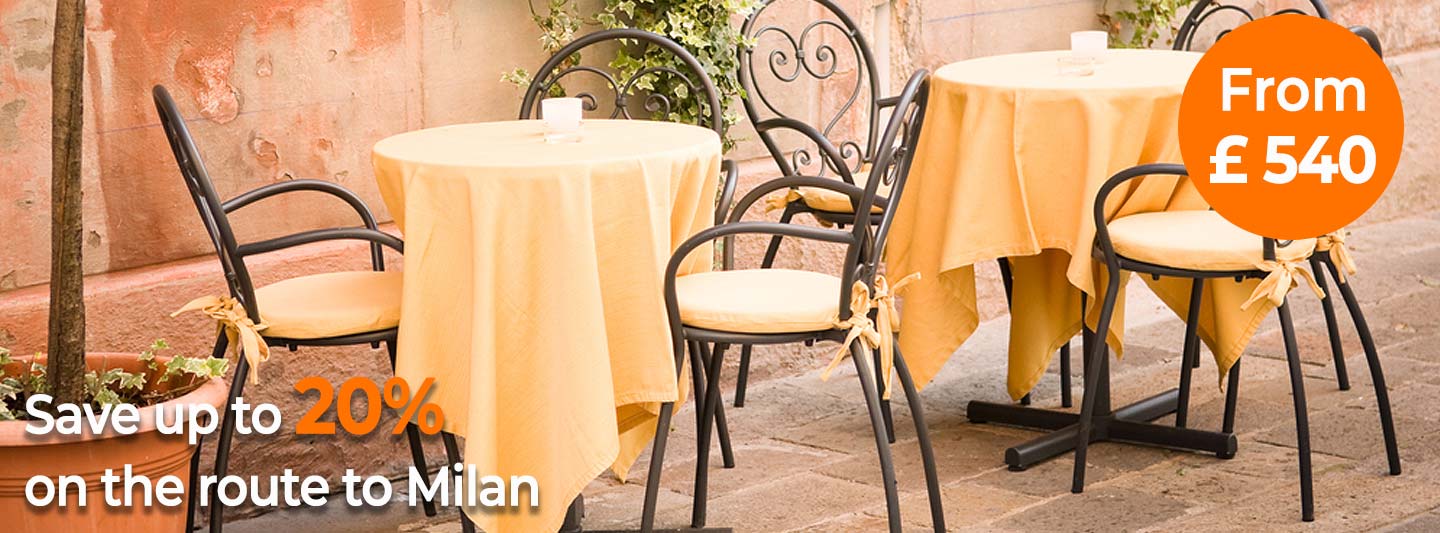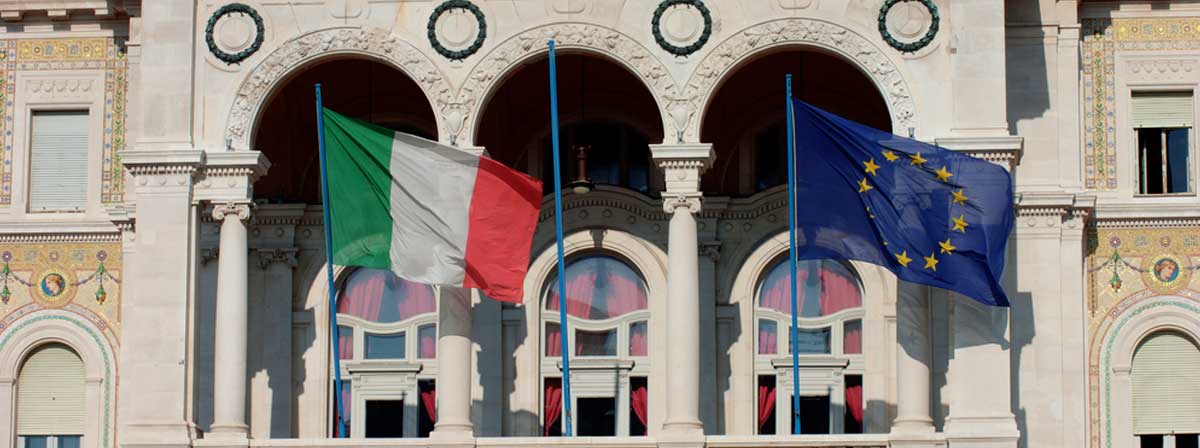
Visit the lovely hill town of Marostica, about 1½ hours from Venice, to see a re-enactment of a live chess duel. In 1454 Lord Tadio Parisio held a living game of chess to decide between two noblemen who wanted the hand of his beautiful daughter, Leonora. The loser had to make do with his younger daughter, Oldrada. He held a grand parade with fireworks, flag-throwing and a great feast.
Every two years the event is repeated, on the pink and white marble slabs imbedded in the centre of the piazza to form the chess board. Fabulous costumes, banners, parades make this an event not to be missed, but tickets are sold out well in advance.
Italy was a founding member of the EU in 1952 and is a member of the Schengen area. The capital city is Rome and the currency the euro. Apart from the mainland, Italy includes the islands of Sicily, Sardinia, Elba and others. Two independent states lie within Italy: the Vatican city in Rome and the Republic of San Marino.
Italy benefits from its history in the centre of the vast Roman Empire. This has left a huge archeological heritage. Then the medieval and renaissance produced great thinkers like Da Vinci and Galileo, further enhanced by incomparable artists such as Michelangelo and Botticelli, and so much more. You can never be stuck for something to do or places to visit.
Although Britain is not a member of the Schengen area, and therefore customs formalities apply, because we are members of the EU, there is little of consequence to concern the average Briton relocating to Italy.
Currency
there are no restrictions. Free import of goods bought from the EU with some restrictions on the amount of alcohol and cigarettes. Medicines for personal use only.
Dogs and cats require their own pet passport, microchips, rabies vaccinations within 1 year, but not closer than 21 days from departure, and up-to-date routine vaccinations. You could contact the Italian Embassy in London (tel: 020 73122230) for details of your personal circumstances, and for other pets. If you intend to bring the pet back to the UK you must ensure the rabies vaccinations are kept up to date.
You will need to register at the Anagrafe, where you will get a certificate of registration. This document is important for several things, including buying a car. You will need the following:
Application form which you can get from the Polizia Distato website.
Declaration of presence
As the UK is not a member of the Schengen area, you may be required to complete a declaration of presence. Obtain and complete the declaration of presence at the airport on the day of arrival; keep a copy of the receipt. You will need this when you register, and if you do not present it within eight days you could be expelled from Italy. You may find the bureaucracy trying at times.
After five years you can apply for a long-term residence permit — you must have an income at least as great as the social security benefit.
Italian is the language spoken in Italy today. But in the 15th and 16th centuries both Latin and Italian were used for scientific and technical texts. The Italian used was full of Latin words and over time Latin was used less and less as Italian took over. Now the Tuscan dialect is the official language of Italy, but each region of Italy also has its own dialect, some of these are very distinct and they may be mutually unintelligible. The Sicilian dialect may be regarded as a separate language and it has a long literary tradition older than the official Italian language.
The Vatican City refers to a place — the smallest independent state, with the Pope as head; the Holy See is an organisation, based in the Vatican, and acts as the central government for the Catholic Church.
The Vatican City has no official language, but uses Italian for publishing official documents. On the website you will find Italian, English, French, German and Spanish, but not Latin, Portuguese or Chinese — which you will find on the Holy See’s web site. The Holy See uses Latin for its most important official documents, and publishes its newspaper in Italian, English, French, German, Polish, Portuguese and Spanish. In the Vatican City many languages are used, e.g. the Swiss Guard take their oaths in the language of the canton to which they belong.
The great thing about children is that they seem able to absorb languages easily, and unless your Italian is very good, yours will soon be translating for you.
House prices in Italy have been falling and there are fewer property sales, although the decline appears to be slowing down. They have a property tax (TASI) which has slowed down the recovery and made investment less attractive. There are no restrictions to buying property in Italy. But note that if you use money from outside Italy if must be officially documented so that if you decide to resell the property you can take the money out again. These are the steps usually needed to buy.
Hire a real estate attorney to protect your interests. House sales are slanted against the buyer. Also, in Italy, you may be liable for pre-contract issues, although, if you do feel you have been treated unfairly you can file charges to be reimbursed.

Choose a property, and make an offer. You have to pay 1% of the purchase price — and your offer is not binding on the seller. Put a written time limit on your offer, so that you are not left hanging. Only when the seller accepts does the deal become binding.
A preliminary contract (compromesso), is then drawn up by the seller, his attorney, or estate agent. This shows the sale price, the deposit, the completion date, the land boundaries and details of the property, plus any other relevant clauses.
Once the contract has been signed you pay the rest of the deposit (10-20%). If you decide to back out you will lose the deposit, or the seller may enforce the sale by legal action. If the seller backs out they pay double your deposit.
Closure takes around six to eight weeks and the notaio (notary), chosen by the seller but acting for both parties, ensures due diligence. He conducts the title search — and when you are satisfied then you pay the final balance, and sign the deed of sale, witnessed by the notaio. You will need ID and your tax code for this.
The notaio will give you a copy of the deed, and also the tax office and land registry. You pay for the sale to be officially registered (between 3 and 8%). The notaio also transfers the utilities to your name, and informs the local police within 48 hours of the sale (anti-mafia laws).
It takes about 15 days to complete registration in Italy. Transaction costs come to between 8.8 and 22.5%.
Prices range from around £20 million for a 16-bed lakeside property in Sardinia to a “1-bed ruin” for £6 476 in Sicily. You will find plenty of examples on the Rightmove website.
It usually costs more than you expect, so check your finances carefully. Currency rates will affect you.
You need to register with the Italian authorities including the SSN (Servizio Sanitario Nazionale). You will then make national insurance contributions, and be entitled to state-run healthcare like Italian nationals.
There is a pdf leaflet: “Access to the NHS by foreign citizens” which gives detailed information on the healthcare system, how to register with the SNN and obtain your SSN medical card. You will need this every time you want to use the health service.
If you receive a UK state retirement pension or long-term incapacity benefit, you may be entitled to state-funded healthcare paid for by the UK. You’ll need to apply for form S1 from the International Pension Centre (tel: 0191 218 7777). You need to register your S1 with the Italian SSN — this entitles you to an EHIC issued by the UK, which allows access to medical care in other EEA countries, including Britain.
It is wise to KEEP YOUR OWN ACCURATE AND DETAILED MEDICAL RECORDS! One good thing for us is that many doctors speak good English and are happy to practise it.
The NHS website gives excellent advice and up-to-date information.
The European Free Movement of Workers agreement means you can live and work in Italy without work permits or visas. If you are moving for employment, the administrative details may be handled by the employer. Your ability to find work depends upon your language skills. English is a bonus, but it helps to be fairly fluent in Italian.
Under Italian law every employee must have an employment contract for a job for which they expects to be paid. Although some employers are less than keen to provide one, always insist on a written contract. Employee and employer are obliged to follow the rules and regulations established under Italian law and to abide by the conditions laid down in the contract.
There are usually no hidden surprises or traps for the unwary in an Italian employment contract. Nevertheless you need to know exactly what it contains before signing it. If your Italian isn’t fluent, you should try to obtain an English translation, as your language ability would need to be excellent to understand the legal jargon that goes into some contracts. Italian employers seldom provide foreigners with contracts in English.
For an introduction to self-employment go to AngloInfo website.
If you are a pensioner, you need to inform the IPC (International Pension Centre) to prevent problems with your pension payments (tel: 0191 218 7777).
Italy has double taxation agreements with the UK so you will not be taxed twice, provided you ensure that the tax offices are aware of your circumstances. You can arrange to have your pension paid directly into your Italian bank account, and still benefit from the increases as if you still lived in Britain. Contact HMRC and your pension providers well before you leave the UK.
If you’ve only worked, lived or are working abroad then you must claim the state pension through the relevant authority of the country where you currently live and have worked in.
In Italy there is plenty of variety in the bus services, from fast intercity to rural slower services, with access to smaller communities, and they almost always leave on time. Tourist information centres usually have timetables, and you can buy tickets from bars, dispensing machines or on the bus itself. Always check the availability if travelling on Sunday as there may be no service then. Buy your ticket before boarding and validate it once aboard. Rome, Naples, Milan and Turin have metro systems. Buses in Rome can be very crowded. Keep any valuables hidden. Be aware that if passengers are closely squashed together, thieves may be operating.
Taxis are available from taxi ranks. If you phone for one, the meter starts running from the time of your call, not your pick-up.
In Venice you either walk or travel on the canal in vaporetti, which are small passenger ferries.
Trains are good value, and the better trains are fast and comfortable. If you want a seat, book ahead. You can buy tickets at travel agents, sometimes on the internet; if you buy at the station, allow time for this.
Italian drivers can be aggressive, fast and mostly skillful. It is normal to lane hop, brake late, and tailgate at 130km/h. People may not slow down to let you out — if you see a gap, go for it. If you are a woman driver, expect to be overtaken, anywhere, anyplace, anytime. Italians react swiftly but they’re not used to ditherers, so do whatever you do, but do it decisively. Watch out for scooters who seem to come from nowhere and try to drive early afternoon when the streets tend to be quieter. Beware the priority from the right rule, and watch out at roundabouts as the Italians tend to ignore signals.
Documents you MUST carry:
Forbidden
Italy has such a rich cultural heritage. It is hard to know where to start, but family and children are surely the most important factor for most Italians. Children are everywhere, especially in the cool of the evening, not shut away as can be the case in the UK.
The natural scenery is tremendously varied, from the vertical red slopes of the Dolomites to the vertical sea cliffs of the south, with mountains, pastures, towns and villages all adding to the varied and rich Italian scene. The museums, churches and art galleries are world famous, and as well as delving into the past there is a vibrant modern life with theatre, sport, art and festivals to choose from. Many of the festivals have religious significance, as Italy is predominantly a Catholic country.
The cuisine is as varied as the geography and full of delightful surprises — you do not have to exist on pasta and pizza. As ever, knowing the local language is a huge asset in making friends — crack a few jokes and you will soon be part of the in-crowd. There are a choice of dating agencies, but be cautious, and don’t get carried away by the Italians’ brown eyes and undoubted charm.
Tourist information centres have a generous amount of information on the sites to visit, and the local library will have details of the culture — theatre, music, art, exhibitions on such topics as painting, sculpture, architecture and many other fascinating things for you to enjoy. You will find a few sketches of popular Italian hand gestures at Girl in Florence website.
Jan 1 New Year’s Day
Jan 6 Epiphany
April Good Friday/Easter Day
Easter Monday
Apr 25 Liberation Day
May 1 Labour Day/May Day
Jun 2 Republic Day
Aug 15 Assumption of Mary
Nov 1 All Saints’ Day
Dec 8 Feast of the Immaculate Conception
Dec 25/26 Christmas Day
In addition there are several local holidays, related to various saints.
There are several sites where you can get information about expat clubs, news and communities. These three sites will give you a taste of what is available.
Learn Italian — not to solve all your problems, but at least find out what they are. And remember that Italy is not a cheap country.
Check here for free quotations of removals to Italy.
 Pension plan in Italy
Pension plan in ItalyPensions are often associated with retirements and old age citizens, in essence a…